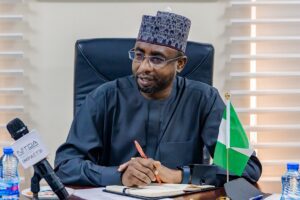
Ericsson report highlights potential benefit of 5G adoption to GDP growth
By Ibiyemi Mathew
A new study by Ericsson commissioned to management consulting firm Analysys Mason has highlighted the potential benefit of 5G to GDP growth in 15 national emerging markets.
The report which revealed that 15 countries could benefit from GDP growth between 0.3 and 0.46 percent through 2035, with an estimated three-to-seven-fold cost-to-benefit ratio.
Called the Future Value of Mobile in Emerging Markets, the report examines the impact of multiple 5G spectrum deployment options to facilitate enhanced mobile broadband and fixed wireless access (FWA) across consumer, industry, logistics, rural and public services clusters, and spanning several business case options, including verticals.
The detailed methodology included using national government statistics and reports, Ericsson network insights and innovative mapping techniques — based on population density distribution and existing national infrastructure such as, road and rail networks, and agriculture — to create a cost-to-benefit model across the different deployment options.
Deployment options are based on the starting assumption of having 5G baseline rollout added to existing mobile radio network sites. Additional options explore the extra benefits of adding Low-Band 5G spectrum coverage beyond the baseline (delivering wider geographical coverage at the lower end of 5G capabilities and suited to agriculture or logistics deployments) or Mid-Band 5G spectrum coverage — delivering smaller geographical coverage per site, but with higher capacity and speed, suitable for manufacturing, automation, industry and advanced services.
Expanded Mid-Band 5G coverage is identified as the key success factor — with the potential to deliver about 80 per cent of the economic benefits. Benefits from the Smart Industry and Smart Rural clusters account for 85-90 per cent of the total economic benefits in each emerging market.
Agriculture is a significant sector in all 15 countries – accounting for up to 10 per cent of GDP in some markets. The report estimates that enhanced rural 5G coverage could deliver up to 1.8 per cent uplift in long-term GDP from agriculture. 5G will also promote sustainable farming methods, increase efficiency and reduce agricultural waste.
The study also revealed that baseline 5G deployment cost is estimated between USD 3-8 billion per country. An additional 20-35 per cent investment is required to extend coverage.
The report stated that extending coverage beyond the baseline can generate significant GDP benefits from industrial adoption, especially from mid-band coverage extension.
The results suggest 5G mobile broadband can generate consumer surplus between USD 1-10 billion per country, with coverage extension giving 20-30 percent extra consumer surplus.
Andrew Lloyd, Head of Government and Policy Advocacy, Ericsson, said, “This Analysys Mason Future Value of Mobile in Emerging Markets report provides a detailed breakdown, based on comprehensive research into realistic and achievable scenarios in each of the 15 countries, of the potential economic, social, environmental and national benefits of 5G in these markets. With the backing of governments, regulators and policy makers, each of these 15 countries, and their citizens, stand to benefit significantly from 5G connectivity. In addition to economic benefits, 5G can also reduce climate impact, increase social inclusion, wellbeing and tackle the digital divide in areas where fixed infrastructure availability is poor.”
Janette Stewart, Partner, Analysys Mason, said, “The study highlights the benefits from having the right spectrum available for 5G deployment, both for geographic coverage, for which the low-bands are very suitable, and in the 3.5GHz band where most of the high-capacity 5G deployments in other markets are already taking place.”
The countries addressed in the report research are Bangladesh, Brazil, Chile, Colombia, Egypt, India, Indonesia, Malaysia, Mexico, Morocco, Nigeria, Pakistan, South Africa, Thailand and Turkey.



